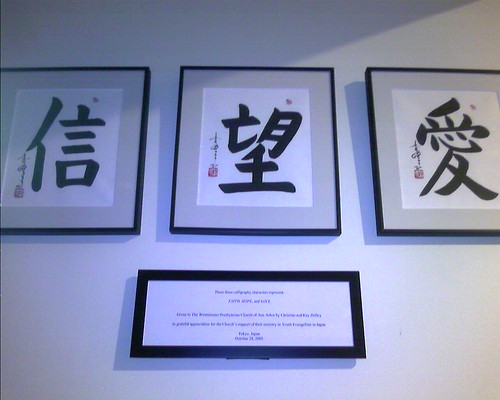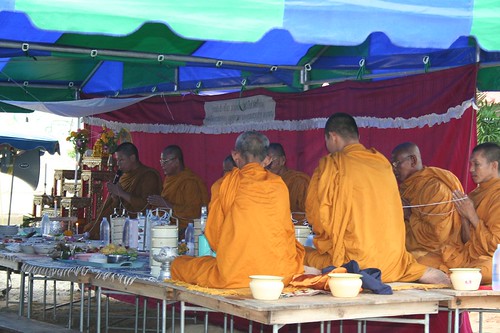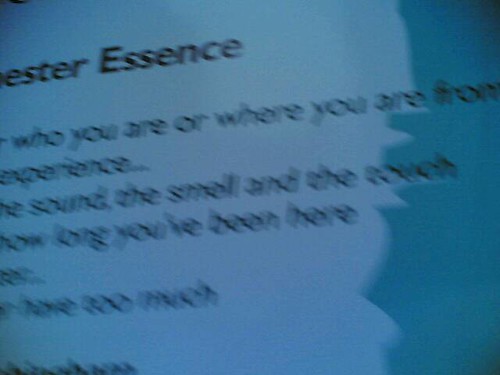
of the existence of a personal God?"
A good friend of mine -- who happens to be a Christian pastor -- asked me this the other day. After giving it some deep thought, I decided to put my conclusions in writing.
While he was raising this question, my friend stated that it was easy for him to believe in a personal God because how can he not believe in someone he has personally met? This experience of "direct knowing" is the evidence to which I attribute the greatest strength -- if someone has personally experienced the effects of gravity, how can one convince him that gravity does not exist?
However, this form of evidence presents a very interesting paradox. How do we explain contradictory "direct knowledge"? In particular, I am thinking of people I have known in the past who had a direct experience of their patron god and matron goddess from their primary pantheon. I am thinking of my friend's experience of directly knowing a single personal God. I am thinking of my own direct experience of the interbeing of us all, how we are each empty of independent existence. I am thinking of Charles Darwin who, in his notebooks, noted that through his studies in the Galapagos, he directly realized that the Christian religion in which he was raised -- indeed, he had been pursuing studies to become a clergyman at the time -- was false; he knew that the existence of such a God was a delusion.
It's my feeling that this paradox itself lies at the core of our absolute nature. Our physical minds are finite. So while we can enhance our five physical senses and our sixth intuitive sense, our human minds simply cannot grasp the totality of all that is. Hence, we're all experiencing some aspect of absolute truth. But it is egotistical and delusional to believe that you can encompass the entirety of the absolute; it is similarly egotistical and delusional to believe that your "direct experience" is completely true and all other contradictory "direct experiences" are false. You cannot be inside another person's mind; hence, it is simply impossible to directly compare your internal experience to another's.
Returning to the original question of what would convince me of the existence of a personal God, my answer is: Nothing. My personal religious experiences of emptiness and interbeing lie in opposition to the existence of a personal God as defined by the Christian faiths. Furthermore, were I to have an experience such as my friend's of a personal god, that would simply be an experience of another aspect of truth, one that I feel lies on a lower organizational level than emptiness and interbeing.
Many people see our world and cannot fathom how such a place could have arisen without the influence of a Guiding Hand. I side with Richard Dawkins and Charles Darwin when they share their utter awe at how nature has evolved through natural selection through the eons. A personal God is not necessary for this process to occur as we've observed, so I see no need to superimpose one over life's systems.
Many people think about the beginning of the universe and cannot fathom how it could have begun without God. The problem here is one of perspective. Our experience of time is linear -- beginning, middle, end -- and we naturally think that such a linear system must apply to the universe too. But given the span of billions of years lying between us and the big bang -- not to mention the nature of singularities in general -- we cannot know for certain what preceded the generation of our universe. One could propose the idea of a God. One could also say that there never was a beginning; generation and destruction may be cycling continuously without beginning or end.
I can hear the arguments already: "But that doesn't make any sense! How could time possibly cycle continuously without a beginning or end? Everything has a beginning. Infinite time is illogical!"
My answer to that is to ask a few counter-questions: how logical is it that time has "shape"? How logical is it that time is inextricably woven into space to form a continuum? How logical is it that an electron can never possibly be said to be at any particular location around a nucleus, but can only be said to be probabilistically located at any one point at any one time around a nucleus? How logical is it that time actually slows down as one's speed approaches that of light? My point is that many of our quantum and relativistic findings defy the limited logic of our minds. I once explained the idea of Schrodinger's Cat to my dad, who simply refused to believe it because it didn't make any sense. That doesn't make the quantum laws it illustrates any less true, though.
The fact is that we cannot know the beginning of nature. We cannot know if it has a beginning at all, regardless of what seems logical. We can conjecture all we want, but such musings are ultimately fruitless and of little use. It is infinitely more important that we accept the truth we have been lucky enough to "directly know," and accept the truth that others have been lucky enough to "directly know." It is infinitely more important to engage in whatever spiritual practice applies to your "direct knowledge," and to dedicate that practice to the benefit of all others and the world around you.
Nothing can convince me that a personal God exists. In the same way, I know nothing can convince my friend that his personal God does not exist. I'd never even dream of trying.






























